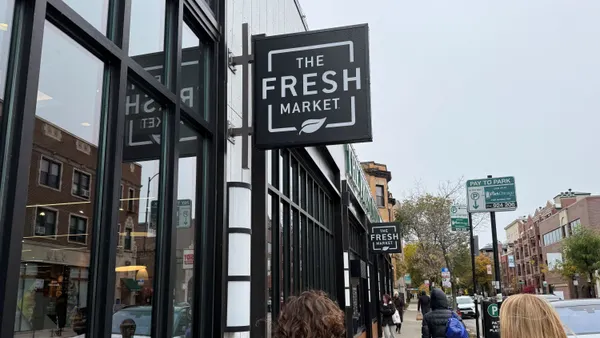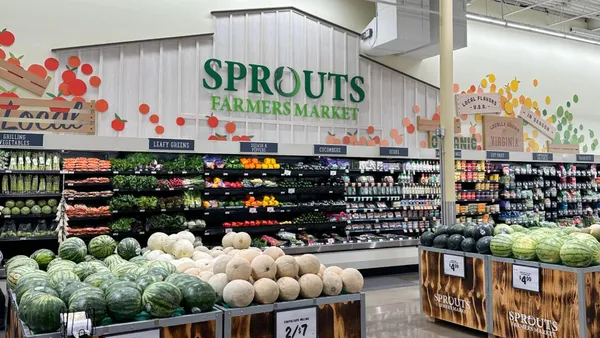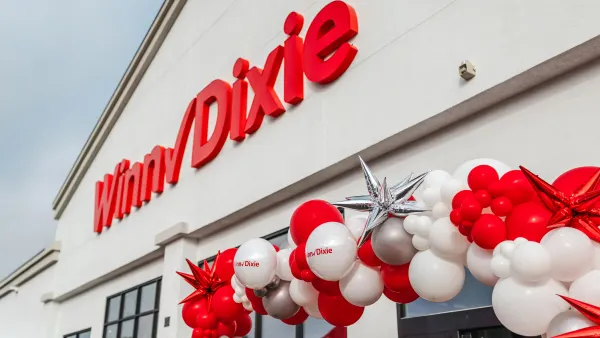Dive Brief:
- Britain's Competition and Markets Authority has blocked the sale of Walmart's Asda supermarket chain to Sainsbury's, saying the deal would have resulted in higher prices, lower quality and overall a "poorer shopping experience," according to a news release.
- The decision follows a preliminary report by the CMA in February outlining the same concerns. Sainsbury's and Asda officials responded with a pledge to reduce prices on everyday goods by 10% for three years, cap fuel margins, ensure fair buying from suppliers and then enlist a third party to oversee its commitments. The merger would have created the U.K.'s largest grocery chain with more than 2,800 stores and nearly 60% market share.
- Walmart misses out on $4 billion in revenue as a result of the blocked deal. In a statement, Walmart International CEO Judith McKenna said the retailer is disappointed by the decision. "Our focus now is continuing to position Asda as a strong U.K. retailer delivering for customers," she said. "Walmart will ensure Asda has the resources it needs to achieve that."
Dive Insight:
With the dissolution of this deal, Walmart misses out on $4 billion that it planned to funnel into growth channels like its rapidly expanding e-commerce business in the U.S. and the newly acquired e-grocer Flipkart in India.
What happens now? Asda's performance has improved lately, with seven consecutive quarters of growth driven by demand for online shopping and private label. So Walmart may not be in a rush to offload the chain. However, analysts say Walmart still has every intention of selling the grocer it acquired back in 1999.
"We do not believe Walmart will want to keep Asda as it is now, and may look to sell Asda to other suitors, but it would look unlikely that other major players in the U.K. would consider it, given the strictness the CMA has displayed," Patrick O’Brien, U.K. retail research director at GlobalData, wrote in an email sent to Grocery Dive. "It opens the possibility of private equity or floating the business, or a foreign retailer entering the market. Amazon will always be speculated about, but we do not believe that taking on a major physical food presence in the U.K. fits with its strategy, despite the Whole Foods deal in the U.S."
Bloomberg, meanwhile, reports that private equity is lukewarm on an acquisition and that Walmart officials are also exploring a possible public offering for Asda.
Hammered by discounters Lidl and Aldi in recent years, Sainsbury's and Asda sought to create a combined company that would leapfrog market leader Tesco. Company leaders assured regulators and the public that the deal would benefit consumers, but the CMA declared the opposite to be true in its February report, dealing what some saw as a knockout blow to the merger.
According to O'Brien, Sainsbury's, Britain’s second-largest grocer, never adequately substantiated its claim.
"One of the key mistakes [Sainsbury CEO Mike] Coupe made was in failing to offer any assurances on price cuts until the CMA's devastating provisional findings in February," he wrote. "It built the rationale for the merger on the rather vague notion that it would reduce prices by 10% by putting pressure on major suppliers, though it didn't make it clear how many products this would include. It only made some assurances of audited price investment later, but this might have had more sway if it had offered them at the start."
As Sainsbury’s struggles, Walmart continues to grow its U.S. business through store remodels, e-commerce and its unequaled scale. The company’s fortunes abroad, however, are a bit more muddled at this point. Walmart sold off the majority of its assets in Brazil last year and had hoped to maintain a non-controlling stake in Asda while also generating revenue. The company’s $16 billion acquisition of Flipkart last year was its largest ever, though new regulations on foreign companies in India have made that deal more costly than anticipated.










